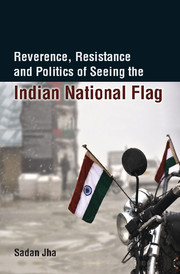Book contents
- Frontmatter
- Contents
- List of Figures
- Preface
- Acknowledgements
- Introduction
- 1 Rise of the Flag
- 2 Flag on the Hut: Totem and a Political Symbol
- 3 The Indian National Flag as a Site of Daily Plebiscite
- 4 Shades of History: A Case of Saffron Colour
- 5 Visualizing an Ideal Political Order
- 6 A Post-Colonial Symbol
- 7 Gendered Symbol, Communal Politics
- Epilogue The Flag as a Sacred Political Symbol
- Bibliography
- Index
Epilogue - The Flag as a Sacred Political Symbol
Published online by Cambridge University Press: 18 December 2015
- Frontmatter
- Contents
- List of Figures
- Preface
- Acknowledgements
- Introduction
- 1 Rise of the Flag
- 2 Flag on the Hut: Totem and a Political Symbol
- 3 The Indian National Flag as a Site of Daily Plebiscite
- 4 Shades of History: A Case of Saffron Colour
- 5 Visualizing an Ideal Political Order
- 6 A Post-Colonial Symbol
- 7 Gendered Symbol, Communal Politics
- Epilogue The Flag as a Sacred Political Symbol
- Bibliography
- Index
Summary
mohi nēko na lāge Rām / O’ Ram! I don't like
in Goron ki Bansi. Tek. / the melody of these white men
chāwal le gayā Gehun le gayā, / they took away rice, they took away wheat
le gayā sāri rui / took away all the cotton
iske badle me kyā de gayā / what they gave in return
do lohe ki sui IImohiII / two needles of iron
sonā le gayā chāndi le gayā, / they took away all the gold and all the silver
le gayā sāri ginni II / took away all the coins
iske badle kyā (sic.) de gayā / what they gave in return
rānge ki ekanni II2II mohi II / an ekkani of Rāngā
bakri le gayā khassi le gayā / they took away female goat, took away male goat
le gayā sārā andā / took away all the eggs
eske badle men kyā de gayā / in exchange what they gave
kāgaj ka ek jhandā II3II mohiII / a flag made of paper.
This poem is ironical and unsettling for a study focused on the flag. The irony is in the contrast that places material necessities of life (i.e. food grain, wealth, money and cattle) as against a symbol, a flag made of paper. It is unsettling as the flag has been stripped down to its bare minimum. Devoid of any utility quotient, it is a mere symbol, that too made of paper and not cloth, making it further vulnerable. One may quip this poetical outburst as trivial. One may argue that the realm of the affective should not be pitted against the materiality of the life. At one interpretative level, expressing the grief over the valuables of the life which were siphoned off by the whites (‘goron’; alluring to the British) at the cost of this symbol makes the presence of this flag tiny and trivial. However, at another level, we see it among a catalogue of objects that completes the itinerary of a life and is observed in that role by the poet here. As an itinerary of this life or as a mise en scène unfolding before a poet, the flag assumes its importance. Its presence acquires some gravity.
- Type
- Chapter
- Information
- Publisher: Cambridge University PressPrint publication year: 2016



